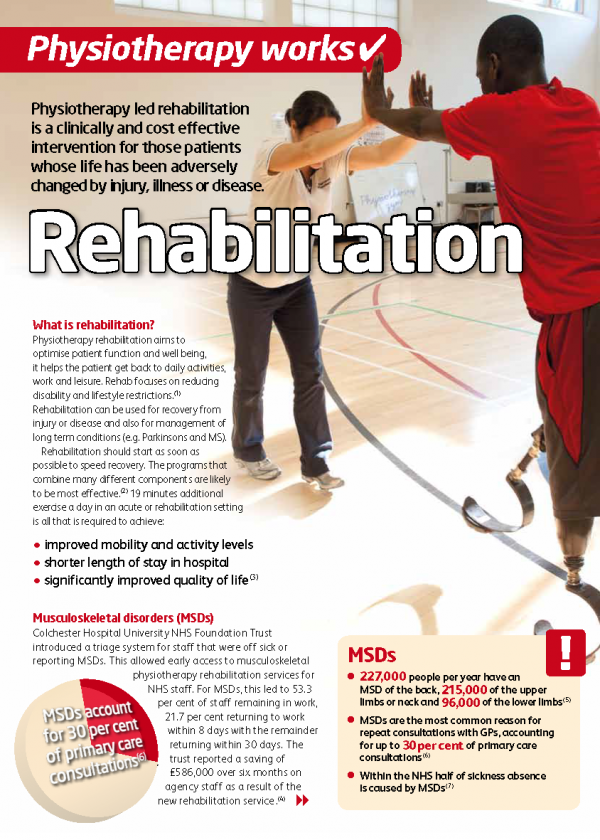If you have been seriously injured, had a heart attack or stroke or have a long-term condition, you will be supported by a team of health professionals. This summary explains how physiotherapy can help.
On this page:
What is rehabilitation?
Rehabilitation is about enabling and supporting individuals to recover or adjust, to achieve their full potential and to live as full and active lives as possible.
Rehab should start as soon as possible to speed recovery. Research shows it can improve your mobility and activity levels, shorten the amount of time you need to stay in hospital or off work and greatly improve the quality of your life.

How can physiotherapy help?
If you require physiotherapy as part of your rehab, you and your physio will work together to:
- assess the nature and extent of your problems
- set goals with you, based on what is most important to you
- provide treatment, support and advice
- regularly evaluate how you are progressing
The general aim is to improve your strength and mobility and to find ways around any problems. For example, if you have had a fall, your physio may recommend some equipment to assist you with walking and an exercise programme to improve your balance and strength.
Rehabilitation can also help you with stamina management in the case of asthma, chronic fatigue syndrome or following major surgery.
The physiotherapist will need to have a good look at how you move; they may need you to remove some of your clothes. It is a good idea to dress comfortably and wear suitable underwear. Everything you tell the physio will be completely confidential.
Physiotherapists are the third largest health profession after doctors and nurses.
They work in the NHS, in private practice, for charities and in the work place, through occupational health schemes.
How can I help myself?
The rehab team will work with you on what is really important to you, so keep them up to date with how you are feeling. You will have exercises to practice by yourself or with friends or family, so do your best to stick with your programme.
If you have any problems with the programme, talk to a member of the team. Rehabilitation can be hard work, so allow for some set-backs as well as progress and chart your successes. Work with your team to get back to the things you enjoy.
- Plan short-term goals as well as your final target for your rehab
- Follow your rehab programme and pace your activities as you recover
- Share your targets and your set-backs with family and friends to keep your motivation going
- Regularly review progress and targets with your physiotherapist to maintain realistic progress plans
Guidance and evidence for physiotherapy
- Clinical evidence regarding physiotherapy and rehabilitation: Physiotherapy Works: rehabilitation
- NHS Choices: Patient information on Physiotherapy
- NHS Choices: Patient information on occupational therapy in rehabilitation Occupational therapy in rehabilitation
Disclaimer
The content on this page is provided for general information purposes only and is not meant to replace a physiotherapy or medical consultation. The CSP is not responsible for the content of any external sites, nor should selection be seen as an endorsement of them.




































